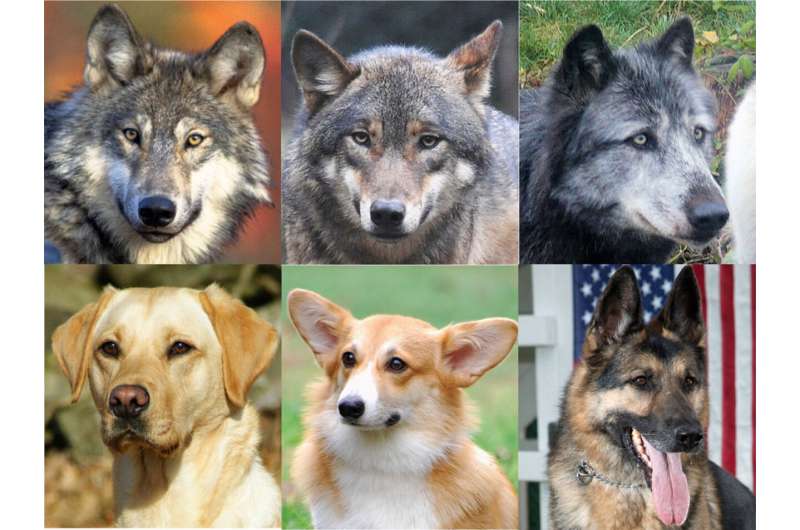December 20, 2023 report
This article has been reviewed according to Science X's editorial process and policies. Editors have highlighted the following attributes while ensuring the content's credibility:
fact-checked
peer-reviewed publication
trusted source
proofread
Study suggests domestication of dogs led to darker irises

A team of animal science specialists at Teikyo University of Science, working with a colleague from Showa University, all in Japan, has found that most dogs have an eye color that is darker than their closet wolf relative, suggesting that darker eye color has evolved due to domestication. In their study, reported in the journal Royal Science Open Science, the group compared the eye color of multiple wolves and dogs.
Prior research has suggested that all modern domesticated dogs are descended from a single ancient ancestor, a now-extinct species of wolf. Their closest modern relative is the gray wolf, which has notoriously light-colored irises, giving them the reputation of having yellow eyes. It is suspected that the extinct relative had similarly colored eyes.
In this new study, the research team wondered if modern dogs evolved darker eyes, and if so, if it was due to the human perception that darker eyes are more friendly, making them more likely to be raised as pets.
To learn more, the researchers compared photographs of 22 gray wolves with 81 images of domestic dogs of a variety of breeds—looking specifically at the color of their irises. They found that almost all the dogs had darker eyes than the wolves, in many cases, significantly darker. This, they suggest, hints at the likelihood of dogs with darker eyes being selectively chosen over thousands of years because of certain characteristics associated with them.
Prior research has shown that humans see other humans and other animals with darker eyes as more friendly than those with lighter or blue eyes. The team conducted another experiment where they asked volunteers to rate the friendliness of dogs in photographs. They found that most of the time, humans rated those dogs with darker eyes as likely to be more friendly.
The research team notes that one of the reasons humans might tend to see dogs with darker eyes as more friendly is that it is more difficult to determine pupil size—changes in size or overall size of pupils have been found to trigger negative emotions in people.
More information: Akitsugu Konno et al, Are dark-eyed dogs favoured by humans? Domestication as a potential driver of iris colour difference between dogs and wolves, Royal Society Open Science (2023). DOI: 10.1098/rsos.230854
Journal information: Royal Society Open Science
© 2023 Science X Network



















